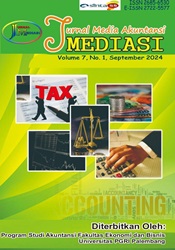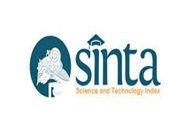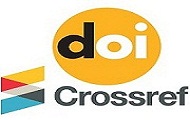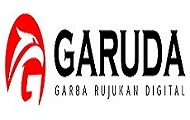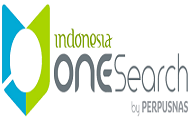Analisis Faktor-Faktor Yang Mempengaruhi Kinerja Realisasi Anggaran Pendapatan Dan Belanja Desa di Desa-Desa Kecamatan Belitang Madang Raya
DOI:
https://doi.org/10.31851/jmediasi.v7i1.16761Abstract
ABSTRAK
Penelitian ini bertujuan untuk mengetahui faktor-faktor yangmempengaruhi kinerja realisasi anggaran,,pendapatan dan,belanja desa di Kecamatan Belitang Madang Raya Kabupaten Ogan Komering Ulu Timur Tahun anggaran 2021. Metode yangdigunakan dalam peneliitian ini adalah metodeekualitatif, sempel dalam penelitian ini berupa Transparasi, Akuntabilitas, Partisifatif, serta Taat dan Tertib anggaran, sumber,data dalam penelitiian ini adalah data seekunder, teknik pengumpulan data yang,digunakan adalah teknik dokumentasi, wawancara,dan observasi,teknik analisis data yang diigunakan adalah analisisdeskriptif kualitatif. Hasil penelitian analisis faktor-faktor yang,mempengaruhi kinerja realisasiaanggaran pendapatan dan,,belanja desa di desa-desa kecamatan belitang madang raya tahun anggaran 2021 pada tahap transparasi sudah sesuai Permendagri No 20 Tahun 2018, pada tahap akuntabilitas juga sudah sesuai dengan Permendagri No 20 Tahun 2018, dalam tahap partisipatif masyarakatuntuk berperan aktif dalamppembangunan desa masih kurangnya tingkatkkepedulian dan kesadaran-masyarakat. Serta Taat dan Tertib anggaran sudah menerapkan apa yang sudah di tetapkan oleh Pemerintah.
Kata Kunci : Transparasi, Akuntabilitas, Partisipatif, Taat dan Tertib Anggaran Pendapatan dan Belanja Desa.
ABSTRACT
This study aims to determine the factors that affect the performance of the realization of village income and expenditure budgets in Belitang Madang Raya District, Ogan Komering Ulu Timur Regency for the 2021 fiscal year. The methoddused in this study is a quallitative method, the sampleein this study is in the form of transparency, accountability, participation, and budget compliance, the source of data in this study is secondarry data, the data collectionntechniques used are documentation, interviews, and observation techniques. The dataaanalysis technique used is descriptive qualitative analysis. The results of the analysis of the factors that affect the performance of the realization of the village income and expenditure budget in the villages of the Belitang Madang Raya sub-district for the 2021 fiscal year at the transparency stage are in accordance with Permendagri No. 20 of 2018, at the accountability stage, it is also in accordance with Permendagri No. 20 of 2018, in the participatory stage of the communitty to play an activerole in villageedevelopment, there is still a lack of awareness and awareness of the community. And Obedient and Orderly the budget has implemented what has been set by the Government.
Keywords: Transparency, Accountability, Participatory, Obedient and Orderly Village Revenue and Expenditure Budget.
References
Imam, G. (2016). Metode Penelitian Kualitatif:teori dan praktik. Jakarta: Bumi Aksara.
Indonesia, R. (2004). Undang Undang No 32 Tahun 2004 Tentang Pemerintah Daerah. Jakarta.
Indonesia, R. (2004). Undang Undang Nomor 1 Tahun 2004 Tentang Perbendaharaan Negara. Jakarta.
Indonesia, R. (2014). Peraturan Pemerintah Pasal 100 No 43 Tahun 2014 Tentang Pelaksanaan Undang Undang Desa. Jakarta.
Indonesia, R. (2019). Permendagri Nomor 17 Tahun 2019. Jakarta.
Peraturan Menteri Dalam Negeri Nomor 113 Tahun 2014 tentang Pengelolaan Keuangan Desa. (2014).
Indonesia. (2019). Permendes No 17 Tahun 2019 Tentang Prinsip Perencanaan Penganggaran Desa. Jakarta Pusat.
Sugiyono. (2015). Metode Penelitian Kombinasi (Mix Methods). Bandung: Alfabeta.
Sugiyono. (2018). Metode Penelitian Kualitatif. Bandung: Alfabeta.
Downloads
Published
Issue
Section
License
Copyright (c) 2024 Jurnal Media Akuntansi (Mediasi)

This work is licensed under a Creative Commons Attribution-NonCommercial 4.0 International License.
The copyright of the received article shall be assigned to the publisher of the journal licensed under a Creative Commons Attribution-NonCommercial 4.0 International License in line with the license, authors and any users (readers and other researchers) are allowed to share and adapt the material only for non-commercial purposes. In addition, the material must be given appropriate credit, provided with a link to the license, and indicated if changes were made. If authors remix, transform or build upon the material, authors must distribute their contributions under the same license as the original.

